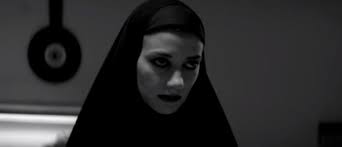An Iranian vampire Western? Is this what the world really needs? On the evidence presented here – yes. Not that this is really Iranian, since it is shot in America and is set in a fictional (Iranian) place called ‘Bad City’. Not that it’s really a Western either, though it looks and sounds like one sometimes. But films need to be promoted, and a gap in the market has clearly been identified – who am I to argue? Hypnotically shot in pristine black-and-white, Ana Lily Amirpour’s directorial debut is not readily categorisable, so ‘Iranian vampire Western’ will do for now.
Initially the film seems to be setting up a Western-style standoff between the hero Arash and his Dad’s drug dealer, but this comes to nothing when the drug-dealer is dispatched by the heroine, a lost soul who spends her hours listening to Western pop on vinyl and rumbling around town on a skateboard and who is – oh yes – a vampire. Having disrupted, for perfectly sound reasons, this male-dominated narrative, the film looks like it might need to get by on style alone (and if any film is capable of that, surely this one is) until it rediscovers itself as a genuinely affecting love story between Arash and our vampire heroine.
When, in the London Film Festival Q&A, an audience member asked what motivates the vampire, the director responded: ‘Boredom.’ Which may be a sign that she was bored by the question, but it could point to a problem with AGWHAAN – namely that its vampire lacks a context, and threatens to become just a ‘cool idea’ floating around in a hipster vacuum. But the context (which went unmentioned in the Q&A and which only manifests itself in the film in the form of the heroine’s traditional headgear) is, I suppose, Islam, or at least Islam in its most oppressive forms: a mindset which views any woman with ideas of her own as a demon.
Vampirism makes perfect sense here, since it allows our heroine to be a monster – a spectre of feminist vengeance – and also seductive, and capable of love. Love mellows her, but not necessarily to the extent that she is going to stop killing men and drinking their blood – indeed, when she kills Arash’s father, that becomes something of a sticking point in their burgeoning relationship, and a delicate compromise has to be worked out, which is what the film is ultimately about.
But it’s a compromise that still allows our heroine to have her cake and eat it, ‘submitting’ to love for a man but with her old appetites intact. Under a strict Islamic regime, a woman managing that kind of trick must indeed be a creature of myth, but in allowing a free female identity to thrive on such barren ground, Amirpour’s film acquires a surprisingly optimistic air, and implies a deal of thought and emotional depth lurking beneath its darkly gleaming surface.


Recent Comments